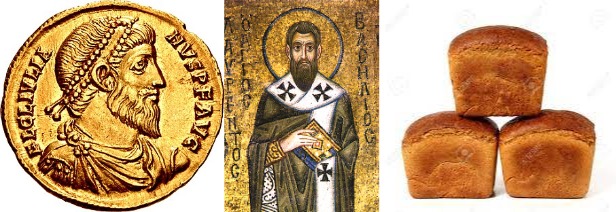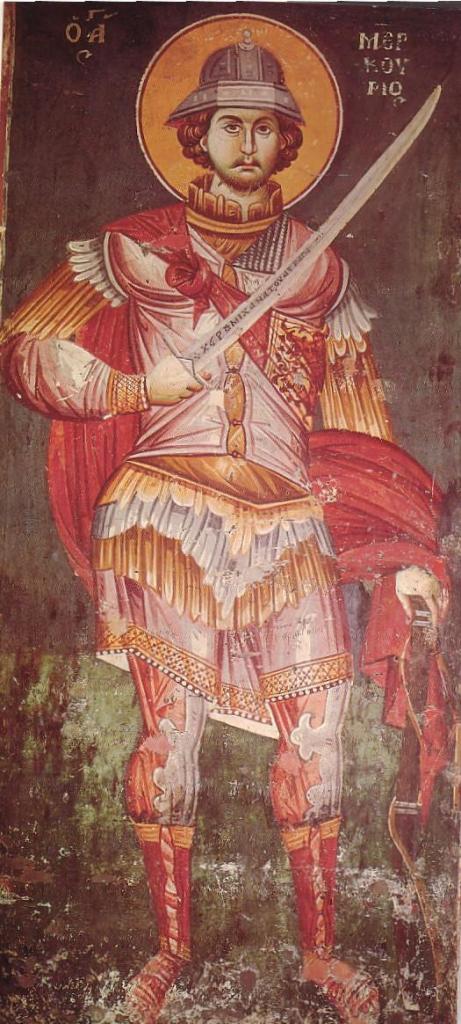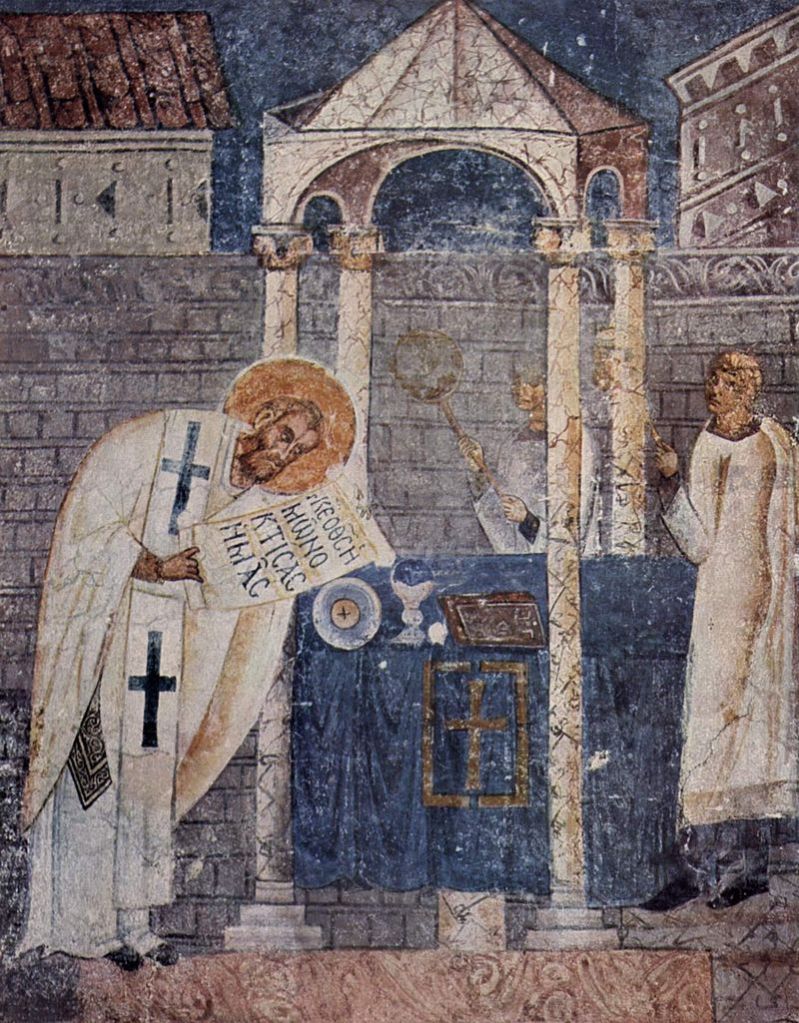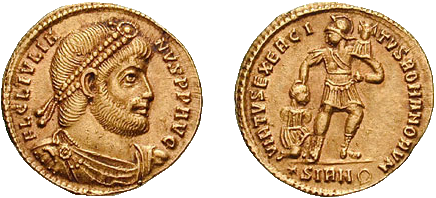The Imperial Apostate, the Great Saint and the Three Loaves of Bread
It may have been short, but Julian’s reign as sole emperor was nothing if not eventful: dispelled fear of war with Constantius II, overseeing his predecessor’s funeral, convening a tribunal to look into corruption in the previous regime, his attempted reinstitution of paganism as the ‘state religion’, trouble in Antioch, invasion of Persia, the disaster that overtook the expedition and then his demise during a Persian raid of the retreating Roman camp.
You may even have heard of the Christian legend behind his death, which saw a certain St. Mercurius rise from his grave (he was reputedly born in 225 and martyred in 250) to kill the emperor. This is likely based on the more factual suggestion that a Lakhmid, possibly Christian, Arab in Persian service did the deed.
What you might not know is that the story of the legendary re-emergence of a long dead martyr saint to kill the apostate Augustus may have begun with a falling out between two former schoolmates over three loaves of bread…
While travelling across Asia Minor in 362 to take up position in Antioch for his campaign against the Persians, Julian met with an old acquaintance somewhere near the city of Caesarea, Basil of Caesarea. But why would an avowed pagan such as Julian know a prominent (and soon to be sanctified) bishop of the Christian Church?
Well, not only had Julian been largely raised as a Christian, he and Basil (along Basil’s fellow Cappadocian Father, Gregory of Nazianzus) had been schoolmates together in Athens in the mid-350s. Such an education must have had a pagan flavour to it and during this period Julian was initiated into the Eleusinian Mysteries, and while he came from a prominent and pious Christian family, Basil’s initial career in law and rhetoric have all the hallmarks of paganism, with Basil himself stating that he “had wasted much time on follies and spent nearly all of my youth in vain labors, and devotion to the teachings of a wisdom that God had made foolish” (Basil, Ep. 223.2).
However, a chance meeting with the charismatic ascetic Eusthatius, bishop of Armenian Sebaste, saw Basil “awoke as out of a deep sleep. I beheld the wonderful light of the Gospel truth, and I recognized the nothingness of the wisdom of the princes of this world” (Basil, Ep. 223.2).
Upon receiving baptism, Basil spent the next 5 years studying ascetics and monasticism around the Roman east, giving away his wealth to the poor, establishing a community around him, writing about communal monasticism, attending the Council of Constantinople in 360 (where he first backed Eustathius and the Homoiousian/‘Semi-Arian’ faction, only to abandon that side in favour of the Homoousian support of the Nicene Creed), before being ordained as a deacon in 362.
During this same period, Julian had been promoted to Caesar by Constantius II and given (figurehead) command of Roman forces in Gaul, where he faced mixed fortunes in the field, with some mistakes almost bringing about disaster, but also punctuated with the significant success at the Battle of Strasbourg in 357 against the Alamanni and in crossing the Rhine on several occasions (Crawford (2016) ch.7-8). And now in 362, the apostate Augustus and Christian deacon met once more outside Caesarea.
We can already see some issues with the legend as it regards Basil as already being the metropolitan of Caesarea at the time of this meeting with the emperor Julian, but Basil’s predecessor as bishop of Caesarea, Eusebius, was still alive in 362. Indeed, Eusebius’ predecessor, Dianio, may have been still alive too. Basil himself was not consecrated as bishop until 14 June 370.
Upon meeting the emperor, the still-deacon Basil presented Julian with three loaves of bread. The emperor did not take kindly to this gift proclaiming that the deacon would be rewarded with grass from a field!
Basil tried to explain that he meant no insult in this gift, merely offering Julian a sample of what Basil himself ate. Rather than ameliorate the emperor, it enraged him further, with Julian reputedly exclaiming…
“Now accept this gift, and when I return from Persia the victor, then, I will burn your city, I will remove your infantile people and enslave them, because the gods which I worship they dishonour, and you will receive the appropriate reward.”
But why was Julian seemingly so incandescently angry at Basil’s gift? I think it is a given that the Christian source material is playing up the apostate emperor’s ire, but did he dislike Basil’s gift due its sheer paucity, giving only bread to the Imperator Flavius Claudius Iulianus Pius Felix Augustus?!? Or was it because of the possibly inherent ideas of Christian charity and priestly sharing of want that so perturbed Julian?
Or was it even something more specific to the type of bread – barley – that Basil offered? Whether the geographical preference was for rye or wheat, using barely was definitely considered a distant second best. Basil, along with all the other clergy, ate bread made from barely to demonstrate their humility. However, Julian may have felt, not without cause, that ‘barley was only fit for horse’, hence why he offered the holy man some grass/hay in return (cf. Lacey and Danziger (1999) 118).
There is also the suggestion that in giving Basil the grass from a specific field, Julian was actually gifting him the right of pasturage on that field. The Christian sources seem to present this as an error on the part of Julian, which contributed to his anger, but it is possible that they have inadvertently revealed the truth behind this story. Might it be that in meeting his old school friend, Julian readily accepted the gift of bread and, like the deacon had done in sharing in the barley harvest, reciprocated with a similar gift of pasturage, possibly including barley itself?
Whatever the truth the behind this story, the legend built up that after this imperial threat to return and destroy Caesarea, Basil and his flock prayed before an icon possibly of St. Mercurius in the church of the Virgin Mary on ‘Mount Didymus’. Slight differences in the story have either the Virgin herself call forth the martyr saint Mercurius, with Basil then going to the saint’s shrine to find his body missing or Basil prayed for the saint to ask God to prevent Julian from returning from Persia to destroy Caesarea, with the reply being that the image of the spear-wielding Mercurius became invisible…
Within seven days of Basil telling his flock that Mercurius’ body was missing, word arrived that Julian the Apostate was dead… killed by a spear… Best to accept a gift of bread without comment it seems…
Bibliography
Baynes, N. H. ‘The Death of Julian the Apostate in a Christian Legend’, JRS 27 (1937) 22-29
Crawford, P. Constantius II: Usurpers, Eunuchs and the Antichrist. Barnsley (2016)
Dawkins, R.M. ‘A Byzantine Carol in Honour of St. Basil’, JHS 66 (1946) 43-47
Hildebrand, S. M. Basil of Caesarea. Grand Rapids (2014).
Lacey, R. and Danziger, D. The Year 1000: What Life Was Like at the Turn of the First Millennium – An Englishman’s World. Boston (1999)
Rousseau, P. Basil of Caesarea. Berkeley (1994).
http://full-of-grace-and-truth.blogspot.com/2009/12/vision-of-st-basil-great-and-julian.html





